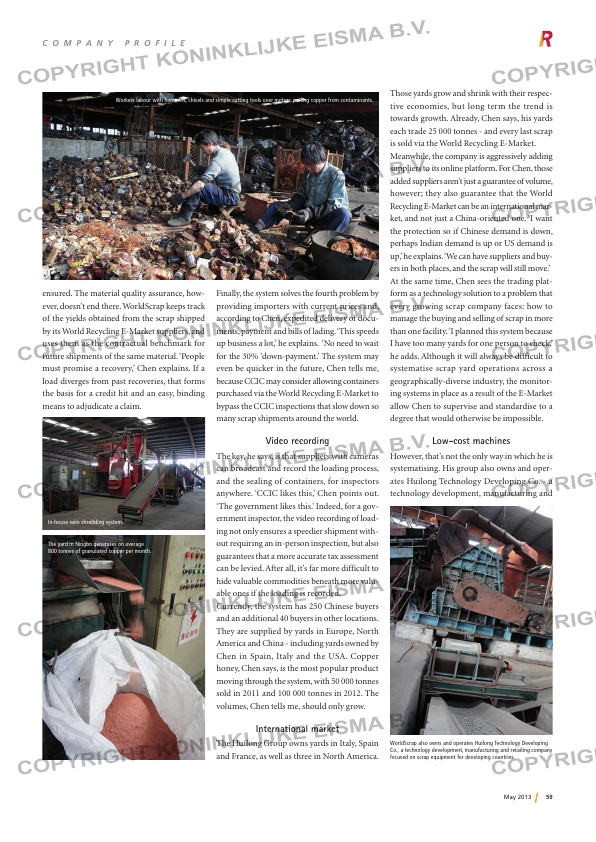Page 59 from: May 2013

59May 2013
ensured. The material quality assurance, how-
ever, doesn’t end there. WorldScrap keeps track
of the yields obtained from the scrap shipped
by its World Recycling E-Market suppliers, and
uses them as the contractual benchmark for
future shipments of the same material. ‘People
must promise a recovery,’ Chen explains. If a
load diverges from past recoveries, that forms
the basis for a credit hit and an easy, binding
means to adjudicate a claim.
Those yards grow and shrink with their respec-
tive economies, but long term the trend is
towards growth. Already, Chen says, his yards
each trade 25 000 tonnes – and every last scrap
is sold via the World Recycling E-Market.
Meanwhile, the company is aggressively adding
suppliers to its online platform. For Chen, those
added suppliers aren’t just a guarantee of volume,
however; they also guarantee that the World
Recycling E-Market can be an international mar-
ket, and not just a China-oriented one. ‘I want
the protection so if Chinese demand is down,
perhaps Indian demand is up or US demand is
up,’ he explains. ‘We can have suppliers and buy-
ers in both places, and the scrap will still move.’
At the same time, Chen sees the trading plat-
form as a technology solution to a problem that
every growing scrap company faces: how to
manage the buying and selling of scrap in more
than one facility. ‘I planned this system because
I have too many yards for one person to check,’
he adds. Although it will always be difficult to
systematise scrap yard operations across a
geographically-diverse industry, the monitor-
ing systems in place as a result of the E-Market
allow Chen to supervise and standardise to a
degree that would otherwise be impossible.
Low-cost machines
However, that’s not the only way in which he is
systematising. His group also owns and oper-
ates Huilong Technology Developing Co. – a
technology development, manufacturing and
C o m p a n y p r o f i l e
In-house wire shredding system.
Workers labour with hammers, chisels and simple cutting tools over motors, pulling copper from contaminants.
The yard in Ningbo generates on average
800 tonnes of granulated copper per month.
WorldScrap also owns and operates Huilong Technology Developing
Co., a technology development, manufacturing and retailing company
focused on scrap equipment for developing countries.
Finally, the system solves the fourth problem by
providing importers with current prices and,
according to Chen, expedited delivery of docu-
ments, payment and bills of lading. ‘This speeds
up business a lot,’ he explains. ‘No need to wait
for the 30% ‘down-payment.’ The system may
even be quicker in the future, Chen tells me,
because CCIC may consider allowing containers
purchased via the World Recycling E-Market to
bypass the CCIC inspections that slow down so
many scrap shipments around the world.
Video recording
The key, he says, is that suppliers with cameras
can broadcast and record the loading process,
and the sealing of containers, for inspectors
anywhere. ‘CCIC likes this,’ Chen points out.
‘The government likes this.’ Indeed, for a gov-
ernment inspector, the video recording of load-
ing not only ensures a speedier shipment with-
out requiring an in-person inspection, but also
guarantees that a more accurate tax assessment
can be levied. After all, it’s far more difficult to
hide valuable commodities beneath more valu-
able ones if the loading is recorded.
Currently, the system has 250 Chinese buyers
and an additional 40 buyers in other locations.
They are supplied by yards in Europe, North
America and China – including yards owned by
Chen in Spain, Italy and the USA. Copper
honey, Chen says, is the most popular product
moving through the system, with 50 000 tonnes
sold in 2011 and 100 000 tonnes in 2012. The
volumes, Chen tells me, should only grow.
International market
The Huilong Group owns yards in Italy, Spain
and France, as well as three in North America.
RI-4_CompProfile.indd 59 06-05-13 14:24



